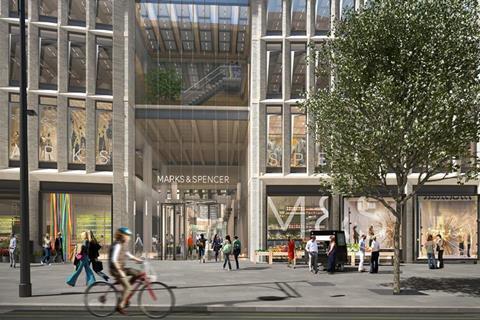
M&S has accused Michael Gove of basing a decision to block its plans to rebuild its Marble Arch store on policy which does not exist.
In a legal challenge which reached High Court this week, M&S claimed Gove “misunderstood and misapplied” national planning policy in arriving at his decision in July last year.
Gove, levelling up secretary, rejected M&S’s plans last summer on the grounds the public benefits would not outweigh harm to nearby heritage sites.
The retailer’s proposal to knock down the 1929 art deco building on London’s Oxford Street and replace it with a modern retail and office complex had already been approved by Westminster council, and gained support from the Mayor of London. But the decision was called in by Gove in 2022 following opposition from heritage and environmental campaigners.
M&S has told the High Court Gove’s decision was based on “the alleged existence of a ‘strong presumption in favour of the reuse of buildings’, as opposed to redevelopment” in the National Planning Policy Framework, which sets out the government’s planning policies for England.
“There is no such policy in or reflected in the Framework,” M&S said in a written argument. “The Framework was thus misunderstood and misapplied: an error of law.”
M&S has also accused Gove of failing to properly explain why he rejected the view of an independent inspector who gave his backing to the retailer’s plans during an inquiry.
“The secretary of state in reaching his conclusions also had to disagree with and/or reject almost every one of the experienced inspector’s key determinative findings and conclusions on the matters of controversy at the inquiry,” said Russell Harris KC, representing M&S.
“He was under a duty to explain ‘fully and clearly’ why he was disagreeing with the expert tribunal and also to understand and rationally deploy the consequences of the multiple and cumulative disagreements in a logical and coherent way: in a way which ‘added up’.
“He failed in these tasks, resulting in errors of law.”
M&S argues the decision is of “fundamental importance to the spatial development of London as a whole and, in particular, to the future of Oxford Street and the West End as an internationally important retail and office location”.
The Department for Levelling Up, Housing and Communities (DLUHC) said in its written argument: “The secretary of state was entitled to say that in the circumstances of this case, there should be a strong presumption in favour of reusing buildings.”
“It is abundantly apparent the secretary of state both understood the inspector’s conclusions and gave adequate reasons for disagreeing with them.”
Speaking as the case was heard in High Court on Tuesday (13 February), M&S operations director Sacha Berendji said: “Today we will set out our case for why the secretary of state’s decision to block our proposed redevelopment of our Marble Arch site – which ignored advice from the independent planning inspector and support from Westminster City Council, the Mayor of London and Greater London Authority – misinterpreted and wrongly applied planning policy, with every one of the six counts we raised approved by the Court to proceed to this hearing.
“When our proposal to bring one of London’s most sustainable and energy-efficient buildings into the heart of the West End is rejected and other schemes with lower sustainability benefits are going ahead, it makes it impossible for developers to interpret planning policy, freezing investment and leading many to ask ‘why bother?’, which is a disaster for the economy and the transition to net zero.”
A DLUHC spokesperson said it would not be appropriate to comment while proceedings were ongoing.
A judgement is expected in a few weeks’ time.



















No comments yet